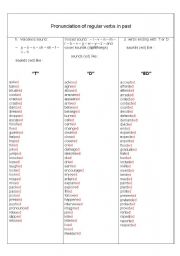
A regular verb is any verb whose conjugation follows the typical pattern, or one of the typical patterns to. The above video may be from a third-party source. Uses of Regular verbs in English Grammar. This is also true of regular verbs ending in 'te' or 'de' - don't forget that the final 'e' of most words in English is NOT pronounced.
#List of regular past tense verbs full
Irregular verbs are verbs that do not follow these rules. Can you say 'want t' or 'include d' Consequently when a word ends with either a 'D' or a 'T' we have to pronounce the full 'ed' sound as a separate syllable: /-dd/ or /-td/. If the word ends in a 'y' then add 'ied' to the end. again I dont believe it How did you fail again What happened this time You wont believe. If the word ends in an 'e', then you can simply add 'd'. Transcript So, how did it go Did you pass No, I failed. The following English irregular verbs are now obsolete and use the standard past and participle forms (-ed). Regular verbs can be changed to the past tense by adding 'ed' on the end. We do not foresee all the irregular verbs ever being standardized, but some of the more minor variations in less commonly used words will probably disappear in the next genration or two. Regular verbs add ed to make the past tense (work / worked) and irregular verbs change their form entirely (go / went), or they dont change at all (put. Simple Present, Simple Past, Simple Future.


The trend, in English, and especially in American English, is to standardize the irregular verbs. Conjugation is the way a verb changes to show person, number, tense, and mood. Table of the most common irregular verbs infinitive


 0 kommentar(er)
0 kommentar(er)
